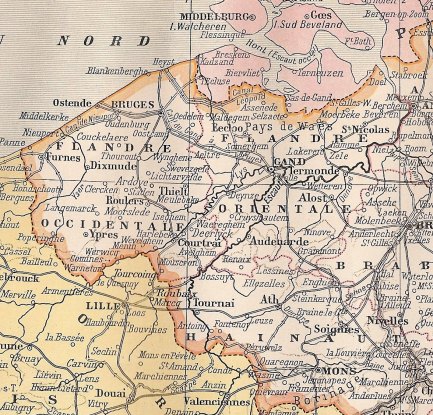On 2 August 1914, Germany, fearing an attack from France through Belgian territory, demanded military access through Belgium.
German Ambassador to Belgium, Herr von Below Saleske, to M. Davignon, the Belgian Minister for Foreign Affairs. Brussels, 2 August 1914.
Reliable information has been received by the German Government to the effect that French forces intend to march on the line of the Meuse by Givet and Namur. This information leaves no doubt as to the intention of France to march through Belgian territory against Germany.
The German Government cannot but fear that Belgium, in spite of the utmost goodwill, will be unable, without assistance, to repel so considerable a French invasion with sufficient prospect of success to afford an adequate guarantee against danger to Germany. It is essential for the self-defence of Germany that she should anticipate any such hostile attack. The German Government would, however, feel the deepest regret if Belgium regarded as an act of hostility against herself the fact that the measures of Germany’s opponents force Germany, for her own protection, to enter Belgian territory.
In order to exclude any possibility of misunderstanding, the German Government make the following declaration:
1. Germany has in view no act of hostility against Belgium. In the event of Belgium being prepared in the coming war to maintain an attitude of friendly neutrality towards Germany, the German Government bind themselves, at the conclusion of peace, to guarantee the possessions and independence of the Belgian Kingdom in full.
2. Germany undertakes, under the above-mentioned condition, to evacuate Belgian territory on the conclusion of peace.
3. If Belgium adopts a friendly attitude, Germany is prepared, in cooperation with the Belgian authorities, to purchase all necessaries for her troops against a cash payment, and to pay an indemnity for any damage that may have been caused by German troops.
4. Should Belgium oppose the German troops, and in particular should she throw difficulties in the way of their march by a resistance of the fortresses on the Meuse, or by destroying railways, roads, tunnels, or other similar works, Germany will, to her regret, be compelled to consider Belgium as an enemy.
In this event, Germany can undertake no obligations towards Belgium, but the eventual adjustment of the relations between the two States must be left to the decision of arms.
The German Government, however, entertain the distinct hope that this eventuality will not occur, and that the Belgian Government will know how to take the necessary measures to prevent the occurrence of incidents such as those mentioned. In this case the friendly ties which bind the two neighbouring States will grow stronger and more enduring.
Source: Belgian Grey Book.




